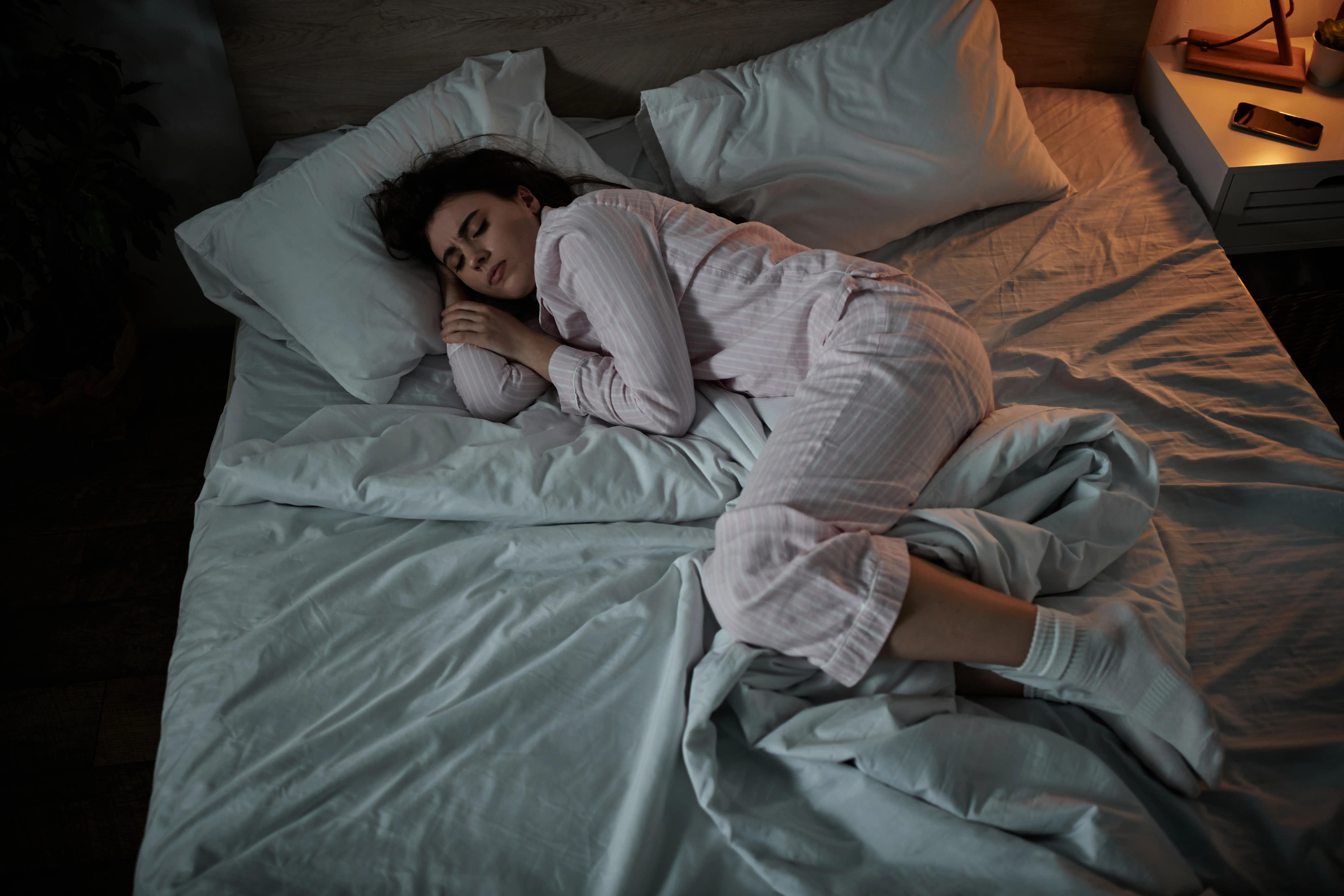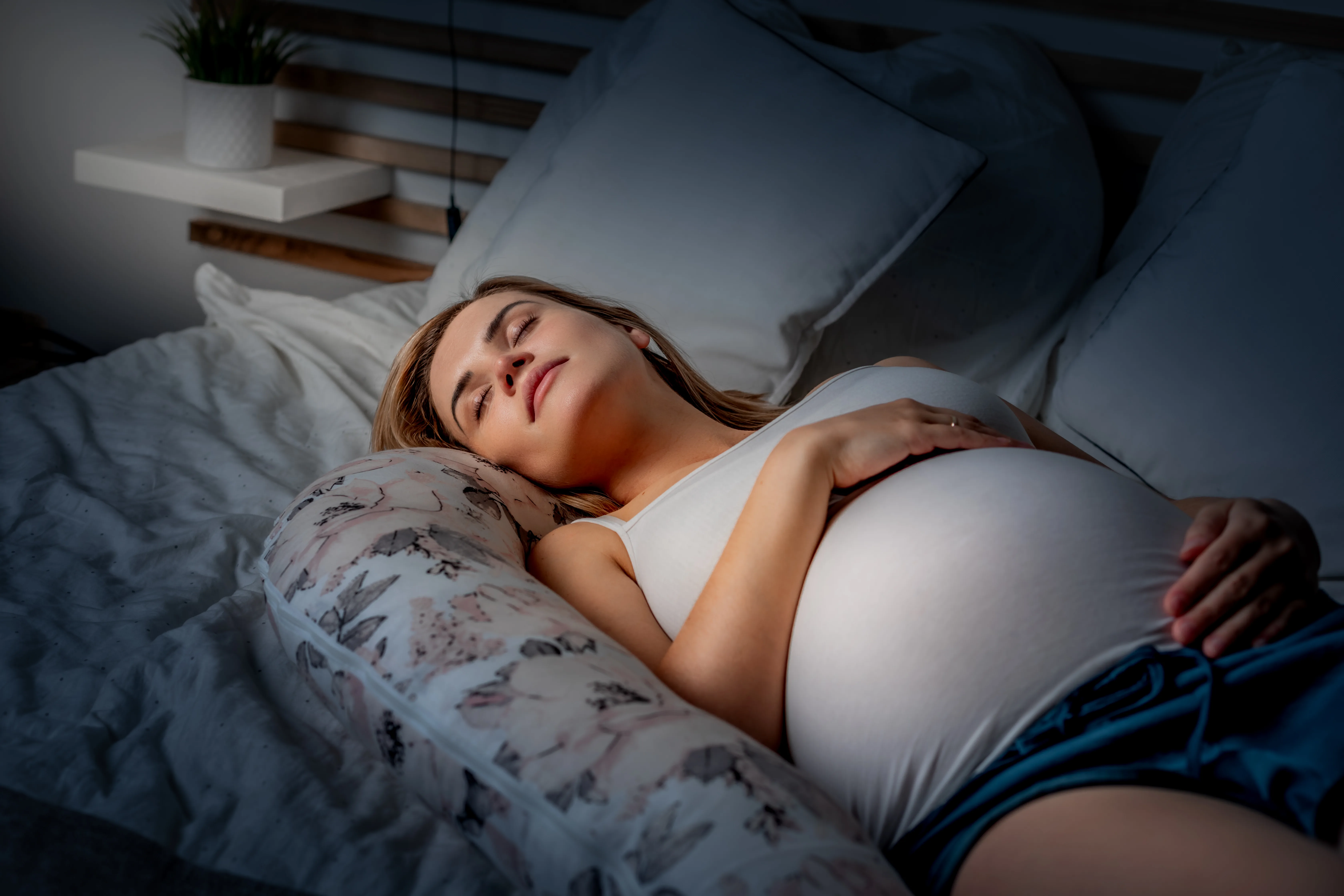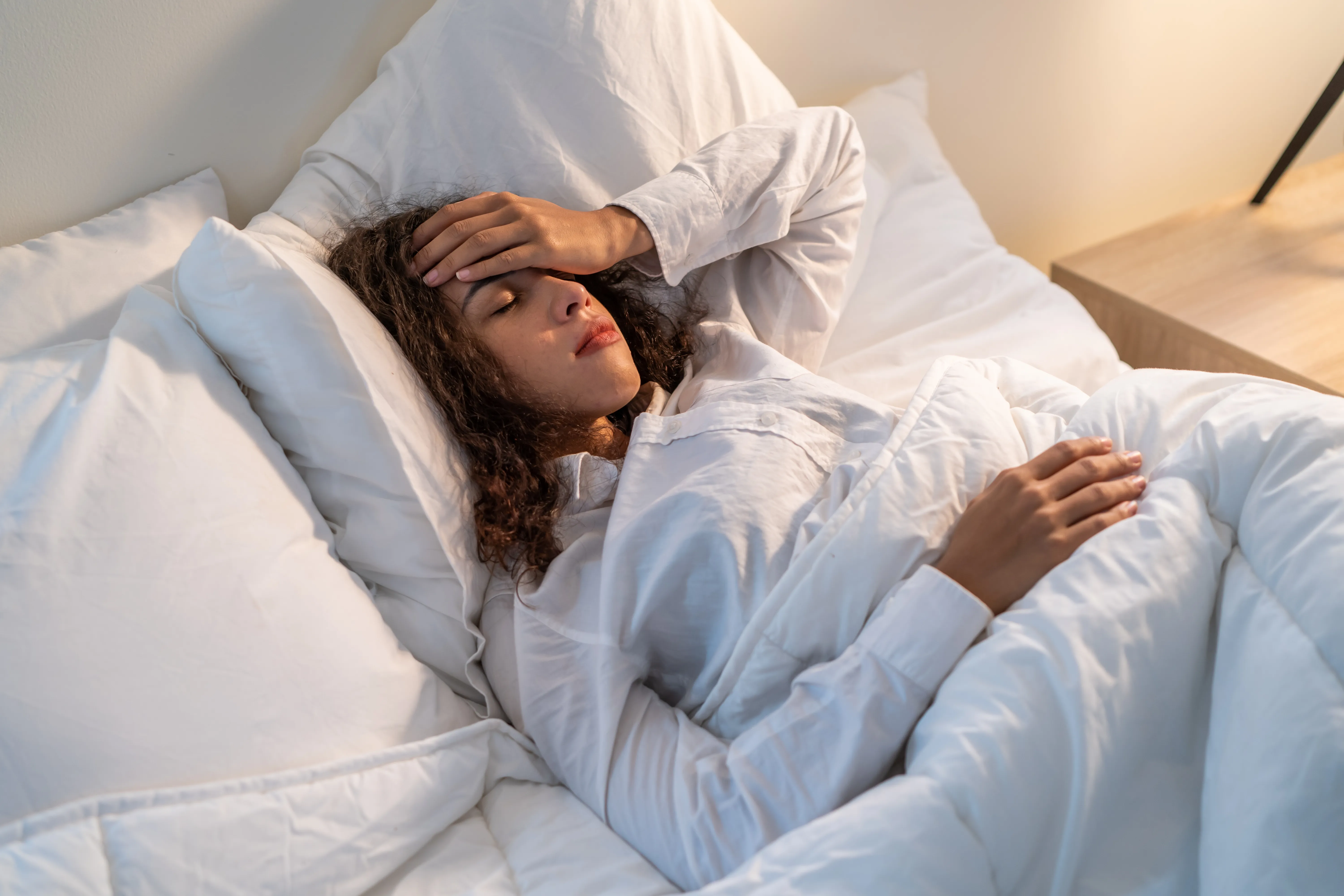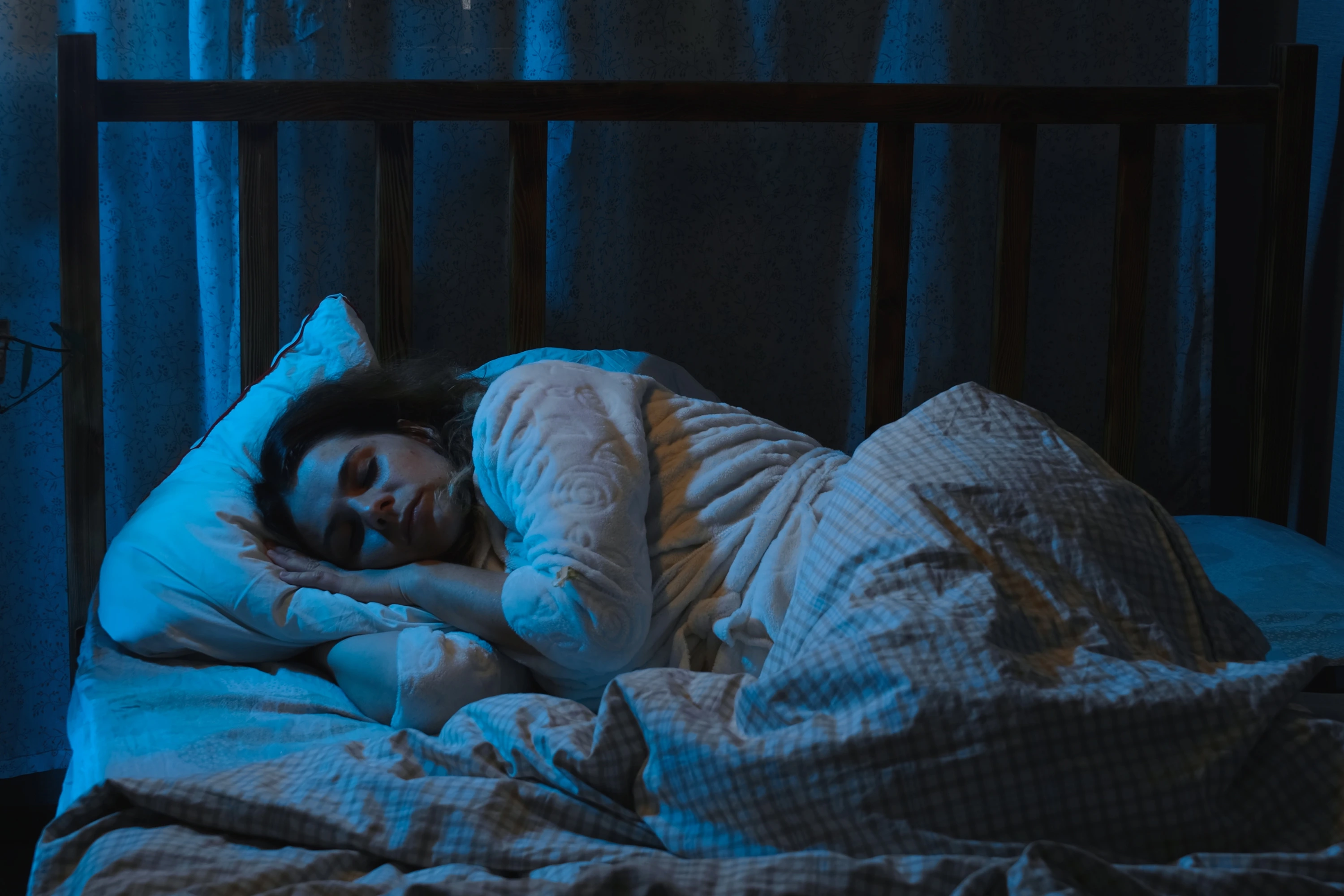Night sweats in women are a common issue that can disrupt sleep and affect overall well-being. These episodes of excessive sweating during the night can occur for various reasons, ranging from hormonal fluctuations to lifestyle factors and underlying health conditions.
For many women, night sweats are a temporary concern, particularly during menopause, but they can also be a symptom of something more serious.
This article will explore the causes, symptoms, and solutions to night sweats, providing helpful information for women seeking to address this condition.
What Are Night Sweats?
Night sweats refer to episodes of excessive sweating that occur during sleep, often leading to damp or soaked clothing and bedding. They often lead to significant sleep disturbances for many women.
The sudden episodes of intense sweating can cause frequent awakenings, making it difficult to maintain deep, restorative sleep. This disruption not only reduces overall sleep quality but can also contribute to daytime fatigue, irritability, and difficulty concentrating.
Unlike the typical sweating associated with warm temperatures or heavy blankets, night sweats are not caused by external factors and can happen even in a cool room. They can vary in intensity and frequency and may be accompanied by other symptoms such as hot flashes, chills, or discomfort.
Night sweats are common in women, particularly during hormonal changes like menopause, but they can also be linked to various medical conditions or lifestyle factors.
Common Causes of Night Sweats in Women

Night sweats in women can be triggered by various factors, ranging from hormonal changes to medical conditions. One of the most common causes is the fluctuation of hormones, when changes in estrogen levels affect the body's ability to regulate temperature.
Understanding the causes, identifying when they may indicate a medical issue, and knowing how to manage them can help women find relief and regain control of their sleep.
Hormonal Changes
Hormonal changes are one of the most common causes of night sweats in women. These fluctuations can occur during various life stages, leading to significant changes in body temperature regulation.
- Menopause: During menopause, estrogen levels drop significantly, which affects the body's thermostat, controlled by the hypothalamus. This hormonal shift can cause hot flashes and night sweats, often leading to sudden feelings of heat, sweating, and discomfort during sleep. You can find a more detailed explanation of this process in a section below.
- Pregnancy: Pregnancy triggers a surge in progesterone levels, which can increase body temperature. The body works harder to regulate this shift, leading to night sweats, especially during the first trimester. As pregnancy progresses, these sweats can become more noticeable, often due to increased blood flow and metabolic changes, all of which we’ll dive more deeply into in a later section.
- Perimenopause: In the years leading up to menopause, known as perimenopause, hormone levels fluctuate significantly. These fluctuations can cause irregular menstrual cycles and disrupt temperature regulation, resulting in night sweats and hot flashes as the body prepares for menopause.
- Postpartum Hormonal Shifts: After childbirth, the body undergoes rapid hormonal changes as it adjusts to non-pregnant states. A drop in estrogen levels can lead to night sweats during the early postpartum period, as the body resets its hormonal balance.
Infections
- Tuberculosis: Tuberculosis (TB) is a bacterial infection that primarily affects the lungs but can spread to other parts of the body. One of the hallmark symptoms of TB is night sweats, which often occur along with fever, cough, and weight loss. If left untreated, TB can lead to severe complications.
- Endocarditis: Endocarditis is an infection of the inner lining of the heart, typically caused by bacteria entering the bloodstream. Symptoms include fever, fatigue, night sweats, and heart murmurs. This condition requires prompt medical treatment, as it can be life-threatening if not addressed.
- Abscesses: Abscesses are pockets of infection, often caused by bacteria, that can form anywhere in the body. As the body fights the infection, night sweats can occur, particularly if the abscess is large or deep. Infected abscesses are often accompanied by pain, fever, and localized swelling.
Medications
- Antidepressants: Selective serotonin reuptake inhibitors (SSRIs) and other antidepressants are commonly associated with night sweats. These medications can alter serotonin levels in the brain, which may trigger sweating, especially during the night when the body is supposed to be at rest.
- Hormonal Medications: Hormonal medications, including birth control pills and hormone replacement therapy (HRT), can impact estrogen and progesterone levels, causing the body to overheat and sweat at night. This can be particularly noticeable during the initial stages of starting or changing hormonal treatments.
- Painkillers: Painkillers, especially opioids, can disrupt the body's normal thermoregulation. Medications like acetaminophen or ibuprofen can also cause sweating as the body metabolizes the drugs. If used over a long period, these medications can trigger persistent night sweats.
Chronic Conditions
- Thyroid Disorders: Hyperthyroidism (overactive thyroid) speeds up metabolism, which can cause the body to produce excess heat, resulting in night sweats. Hypothyroidism (underactive thyroid) can cause chills and night sweats as the body’s ability to regulate temperature is compromised.
- Diabetes: Uncontrolled diabetes can cause fluctuations in blood sugar levels, which may trigger night sweats, especially if blood sugar drops too low (hypoglycemia) during sleep. This is often accompanied by symptoms such as shaking, dizziness, and rapid heartbeat.
- Autoimmune Diseases: Autoimmune conditions like lupus and rheumatoid arthritis can cause inflammation throughout the body, which can interfere with temperature regulation and result in night sweats. In these cases, night sweats may occur alongside joint pain, fatigue, or skin rashes.
Infections or Illness
- Viral Infections: Viral infections, such as the flu or HIV, can trigger night sweats as the body works to fight off the virus. Along with sweating, symptoms may include fever, body aches, fatigue, and chills.
- Bacterial Infections: Bacterial infections, such as urinary tract infections (UTIs), pneumonia, or sepsis, often lead to fever and night sweats. Infections in the bloodstream (bacteremia) can cause widespread symptoms, including night sweats and confusion.
- Fungal Infections: Fungal infections like histoplasmosis or candidiasis can also cause night sweats, particularly in individuals with weakened immune systems. These infections can lead to respiratory symptoms, fatigue, and excessive sweating as the body tries to fight off the pathogen.
Stress and Anxiety
- High Stress Levels: When a person experiences high levels of stress, the body’s fight-or-flight response is activated, leading to an increase in sweat production. This often occurs during the night when the body is less active and trying to rest.
- Panic Attacks: Panic attacks can cause a sudden surge of anxiety and physical symptoms, including sweating, rapid heartbeat, and shortness of breath. Nighttime panic attacks are often experienced as episodes of excessive sweating that can disrupt sleep.
Other Health Conditions
- Hyperthyroidism: An overactive thyroid causes the metabolism to speed up, leading to symptoms like weight loss, heat intolerance, and night sweats. These sweats are often persistent and can occur even during cooler temperatures.
- Hypoglycemia: Low blood sugar levels (hypoglycemia), particularly during sleep, can trigger sweating as the body responds to the energy imbalance. This condition often requires immediate attention to prevent more serious complications.
- Certain Cancers: Night sweats can be an early sign of certain cancers, such as lymphoma or leukemia. These are typically accompanied by other symptoms like unexplained weight loss, fatigue, and fever. Night sweats in these cases often occur with no other apparent cause and can persist over time.
- Hyperhidrosis: Hyperhidrosis is a condition characterized by excessive sweating beyond what is needed to regulate body temperature. It can occur in specific areas, like the hands, feet, or underarms, and it may happen without obvious triggers. While primary hyperhidrosis has no known cause, secondary hyperhidrosis results from underlying health issues, which can sometimes include hormonal changes.
Night Sweats During Menopause
Night sweats are one of the most common and bothersome symptoms experienced during menopause.
As women approach this stage of life, their bodies undergo significant hormonal changes, particularly a drop in estrogen levels, which can disrupt the body’s temperature regulation. This leads to sudden hot flashes and excessive sweating, especially during the night.
Hormonal Fluctuations and Night Sweats
During menopause, hormonal fluctuations, especially a significant drop in estrogen levels, are the primary cause of night sweats. These fluctuations affect the body’s ability to regulate temperature, often leading to discomfort during sleep.
As a woman approaches menopause, estrogen production declines, which disrupts the hypothalamus, the part of the brain responsible for regulating body temperature. This leads to hot flashes and night sweats as the body responds to sudden temperature changes.
In the years leading up to menopause (perimenopause), menstrual cycles often become irregular. These hormonal shifts can cause sudden increases in body temperature, resulting in night sweats. Even though periods may still occur, the body’s hormonal balance is already shifting, leading to these common symptoms.
How Long Do Menopausal Night Sweats Last?
The duration of night sweats during menopause can vary greatly from woman to woman. While some women experience this symptom for only a short period, others may struggle with it for several years.
Most women experience night sweats during the perimenopausal stage and continuing into early menopause. The intensity and frequency typically subside within 1 to 5 years, although this can vary depending on individual factors.
For many women, night sweats tend to lessen or even stop completely once they have gone through menopause. After 12 consecutive months without a period, the body reaches post-menopausal status, and many women find that night sweats diminish as the body settles into a new hormonal balance.
Night Sweats in Pregnancy

Night sweats during pregnancy are a common and often surprising symptom that many women experience as their bodies undergo significant changes. Hormonal shifts, particularly increased levels of progesterone and increased blood flow, can disrupt the body's temperature regulation.
These changes may lead to excessive sweating, especially during the night. While night sweats can be uncomfortable, they are typically a normal part of the pregnancy process, especially in the first and third trimesters.
Why Night Sweats Happen During Pregnancy
- Increased Blood Flow: During pregnancy, the body increases blood volume to support the growing fetus, which raises the body’s overall temperature. As the circulatory system works harder, it can cause the body to overheat, triggering night sweats, especially during the night when the body is at rest.
- Hormonal Shifts: The surge in hormones such as progesterone is a key factor in regulating temperature during pregnancy. These hormonal changes often lead to an elevated body temperature, which may cause sweating at night. Progesterone in particular increases heat sensitivity, leading to more noticeable symptoms during sleep.
When to Expect Night Sweats in Pregnancy
- First and Third Trimesters: Night sweats are most common during the first trimester, due to the sudden hormonal fluctuations, and in the third trimester, when increased blood volume and heat retention are at their peak. The second trimester is usually a period of relative comfort, where night sweats tend to subside.
- Postpartum Sweats: After childbirth, night sweats can also occur as the body undergoes hormonal adjustments. The body expels excess fluids, and hormone levels fluctuate rapidly, often causing sweating at night in the first few weeks postpartum.
How to Manage and Treat Night Sweats

Managing and treating night sweats involves a combination of lifestyle changes and, in some cases, medical interventions.
Whether caused by menopause, pregnancy, or other underlying factors, making adjustments to your environment, clothing, and hydration can significantly reduce the discomfort of night sweats. For persistent or severe cases, medical treatments such as hormone therapy or medications may be necessary.
Lifestyle Adjustments for Relief
- Cooler Sleep Environment: Keep your bedroom cool by using fans, air conditioning, or open windows to ensure proper airflow. A cooler environment prevents your body from overheating and can minimize night sweats.
- Avoid Triggers: Certain foods and beverages, such as spicy foods, caffeine, or alcohol, can trigger night sweats. Reducing or eliminating these from your diet, particularly before bedtime, can help alleviate symptoms.
- Wear Moisture-Wicking Fabrics: Go for lightweight, moisture-wicking fabrics like cotton or specialized sportswear for sleepwear. These fabrics help absorb sweat and keep you feeling dry and comfortable throughout the night.
- Stay Hydrated: Drink plenty of water throughout the day to stay hydrated, especially if you’re sweating excessively. Proper hydration helps your body regulate temperature more effectively and can reduce the impact of night sweats.
Medical Treatments for Night Sweats
- Hormone Replacement Therapy (HRT): Hormone replacement therapy can help balance estrogen and progesterone levels in women, especially during menopause. This treatment can reduce the intensity and frequency of night sweats by addressing the hormonal fluctuations causing them.
- Antiperspirants: For some, using stronger antiperspirants on areas prone to sweating (such as underarms) can help reduce perspiration. These can be prescribed by a doctor for more effective treatment.
- Medications for Underlying Conditions: If night sweats are linked to an underlying condition, such as an infection or thyroid disorder, treating that condition with the appropriate medication can reduce or eliminate night sweats.
When to See a Doctor
- Persistent Night Sweats: If night sweats last for more than a few weeks or months, it’s a good idea to speak with a doctor. While night sweats can be common in certain life stages, like menopause or pregnancy, persistent sweating could be a sign of an underlying health issue, such as hormonal imbalances, infections, or even certain types of cancer.
- Accompanied by Other Symptoms: Night sweats that occur alongside other symptoms, such as fever, unexplained weight loss, chronic fatigue, or pain, should be taken seriously. For example, night sweats combined with a fever could indicate an infection like tuberculosis or endocarditis. Unexplained weight loss along with night sweats can be a red flag for conditions like cancer, especially lymphoma.
- Impacting Daily Life: When night sweats are affecting your sleep quality and daytime functioning, it may be time to consult a doctor. Sleep deprivation due to frequent sweating can lead to fatigue, irritability, and difficulty concentrating, which can impact your overall quality of life.
FAQS
What Causes Night Sweats in Women?
Night sweats in women can be caused by a variety of factors, with the most common being hormonal changes related to menopause, pregnancy, or perimenopause. Other causes include infections, medications, chronic conditions like thyroid disorders, and lifestyle factors such as stress or alcohol consumption.
Can Stress Cause Night Sweats in Women?
Yes, stress can trigger night sweats in women. High levels of stress activate the body’s fight-or-flight response, which can increase adrenaline and cortisol levels, leading to fluctuations in body temperature. These fluctuations may cause sweating, especially during sleep.
When Should I Worry About Night Sweats?
You should be concerned about night sweats if they persist for an extended period (more than a few weeks), are accompanied by other symptoms like fever, unexplained weight loss, or pain, or if they interfere with your daily life and sleep quality.
How Much Night Sweat is Normal?
A small amount of sweating during sleep is generally normal, especially when the room is warm or when you’re experiencing temporary hormonal shifts. However, if night sweats occur frequently, are soaking your sheets, or are associated with other symptoms like a fever or unexplained weight loss, they may not be considered normal.
Conclusion
Night sweats in women, whether caused by hormonal changes, underlying health conditions, or lifestyle factors, can be uncomfortable and disruptive. While they are often a normal part of life stages like menopause or pregnancy, persistent or severe night sweats may indicate a more serious health issue. By understanding the causes and exploring effective management strategies, women can reduce the discomfort of night sweats and improve their quality of sleep.
Jessica H.
Jessica is a reviewer, writer, and sleep enthusiast at Sleepiverse. Jessica graduated with her master's degree in Nursing research and education. She is a registered nurse and currently works in the Intensive Care Unit. Since becoming a nurse, Jessica has worked the night shift, which means a disrupted sleep schedule. Knowing she needed to function at her best while caring for patients at night, she spent a lot of time researching how to sleep well with a difficult schedule.


